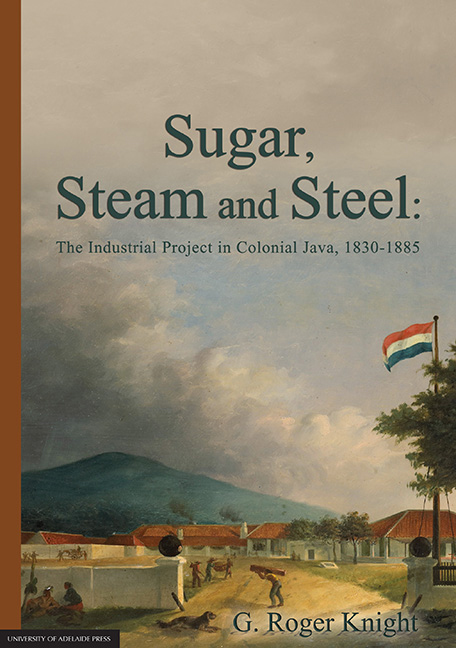Book contents
- Frontmatter
- Contents
- Abbreviations and Glossary
- Acknowledgements
- Introduction: Java Sugar, an Industrial Project and the ‘Oriental Cuba’, 1830-85
- Part I The ‘Industrial Revolution’ in Sugar Manufacture
- Part II The ‘Peasant’ Economy, the Money Trail and the Bourgeoisie
- Part III Metamorphosis
- Conclusion: The Future of an Industrial Project: The 1880s and Beyond
- Archival Sources
- Bibliography
Conclusion: The Future of an Industrial Project: The 1880s and Beyond
Published online by Cambridge University Press: 24 October 2017
- Frontmatter
- Contents
- Abbreviations and Glossary
- Acknowledgements
- Introduction: Java Sugar, an Industrial Project and the ‘Oriental Cuba’, 1830-85
- Part I The ‘Industrial Revolution’ in Sugar Manufacture
- Part II The ‘Peasant’ Economy, the Money Trail and the Bourgeoisie
- Part III Metamorphosis
- Conclusion: The Future of an Industrial Project: The 1880s and Beyond
- Archival Sources
- Bibliography
Summary
During the middle decades of the nineteenth century (1830s-1880s), Java became, perhaps somewhat surprisingly, a world leader in the industrialised manufacture of sugar. It thereby laid the foundations for the Dutch colony's transformation into the ‘Oriental Cuba’, an Asian counterpart of the foremost of the sugar industries in the New World. It did so, as we have seen in the preceding account, on the basis of a number of complementary developments. One was the determination in Dutch colonial circles from the late 1820s onward to develop a proto-command economy in the Indies, with a view to exploiting the agricultural resources of Java, in particular, as the basis for large-scale production of ‘world’ commodities — the profits from which would flow back to an impoverished Holland. Though not envisaged initially as such, sugar became the centre-piece of the new Cultuurstelsel or System of [State] Cultivations (even though coffee continued to supply the greater part of the island's exports until sometime in the 1880s); and the state's largesse, in the form of capital loans, working capital, commandeered access to land and to local, servile labour was absolutely crucial to the establishment of the industrial project.
The Indies Government's achievement was twofold. Its ability to harness to the Stelsel — and in so-doing greatly expand — an elaborate labour-service regime that it had inherited from the pre-colonial state combined with a transformative ‘peasantisation’ of the island's rural social-economic formation. In tandem, these developments created an agrarian basis for sugar production which had few or no parallels elsewhere in the international sugar economy of the period. The upshot was a sugar complex, embedded in a much larger ‘peasant’ economy based on the cultivation of rice and second crops, which eschewed plantations and slaves and operated instead in the context of the forced labour of peasants and of ‘cane-gardens’ comprising fields taken from peasant farmers on a rotational basis. Very neatly, though largely contingently, the Stelsel exploited peasants without (formally) expropriating them, though its effective operation depended to a degree on a skewed access to resources in ‘village’ Java which was vital to the supply of labour that the industrial project required.
- Type
- Chapter
- Information
- Sugar, Steam and SteelThe Industrial Project in Colonial Java, 1830-1885, pp. 203 - 212Publisher: The University of Adelaide PressPrint publication year: 2015



